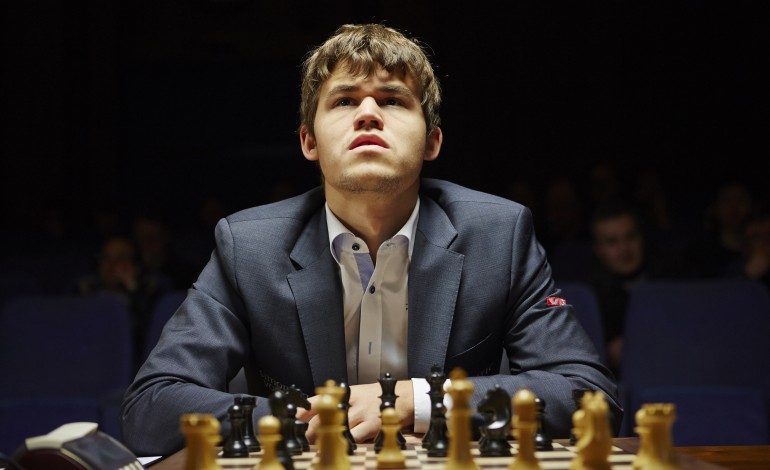

There’s something inherently interesting about prodigies and geniuses. They can show us what humans are capable of and can illustrate how differently we each see the world. When we think of prodigies, usually one of two things come to mind – music and chess. So it’s fitting that Magnus Carlson, the subject of the new documentary Magnus has been referred to as the Mozart of chess.
Collecting footage shot over a staggering 10 years, Benjamin Ree’s debut feature Magnus follows Norwegian chess prodigy Magnus Carlson’s journey to becoming the chess champion of the world. While the film is of course about chess, its also about a Magnus’s relationship with his father, who saw greatness in his young, socially awkward son, and did all he could to foster it.
At times, it can be easy to forget that Magnus is a documentary. Magnus is, in many ways, the archetypal underdog. A young, socially awkward boy who learned the game in an unconventional way, Magnus is something of an outsider in the Chess community. He doesn’t play chess by the book, choosing instead to let his intuition guide him. Its perhaps uniquely fitting that the film culminates in a match against Viswanathan Anand, a chess master who has memorized so many computer simulations of chess games, that he can play games almost without thinking.
Those with an understanding of chess will likely get more out of than those with little knowledge of the game, but this isn’t just a film for chess players. In fact, there’s little discussion of game theory at all. Magnus and his father discuss how he sees the game on a conceptual level, but if you walk in without understanding chess, you’ll walk out knowing just as little. But that knowledge is really cursory and completely unnecessary to enjoy the film. You don’t need much in-depth knowledge to be wowed when Magnus plays a panel of Harvard lawyers, blindfolded, at the same time, wins every game, and writes one of them a play-by-play of their game afterward from memory.
The film follows the Hollywood underdog formula so closely, it’s almost suspect. This dramatic arch can be credited to the film’s editors Perry Eriksen and Martin Stoltz, who were tasked with the monumental undertaking of cutting a decade’s worth of footage down to an almost too brisk 75 minutes. The result is a very surface level documentary that provides an ultimately one-dimensional portrait of its subject. This is a Magnus the chess prodigy, not Magnus the person.
Ree’s film makes for entertaining viewing, but it never feels like we’re getting the whole story. Almost all the film’s interviews are with Magnus or his direct family. We rarely get interviews with his opponents, and never here from Anand, his rival in the film’s third act. This can make you feel like you’re watching the film with blinders on, and while it’s undeniably entertaining, it doesn’t necessarily feel like veracious documentary work.
Verdict: 3 out of 5
Magnus is an undeniably entertaining film. With a decade’s worth of footage, it’s impressive Ree has the discipline to keep things as tight as he does – arguably too tight. I would have liked a little more meat on how Magnus actually plays the game, and the film’s perspective feels overwhelmingly one-sided. But even if we are only getting one side of the story, it’s a compelling one. Magnus merely scratches the surface of the genius of Magnus Carlson, but for many, that will be enough.
